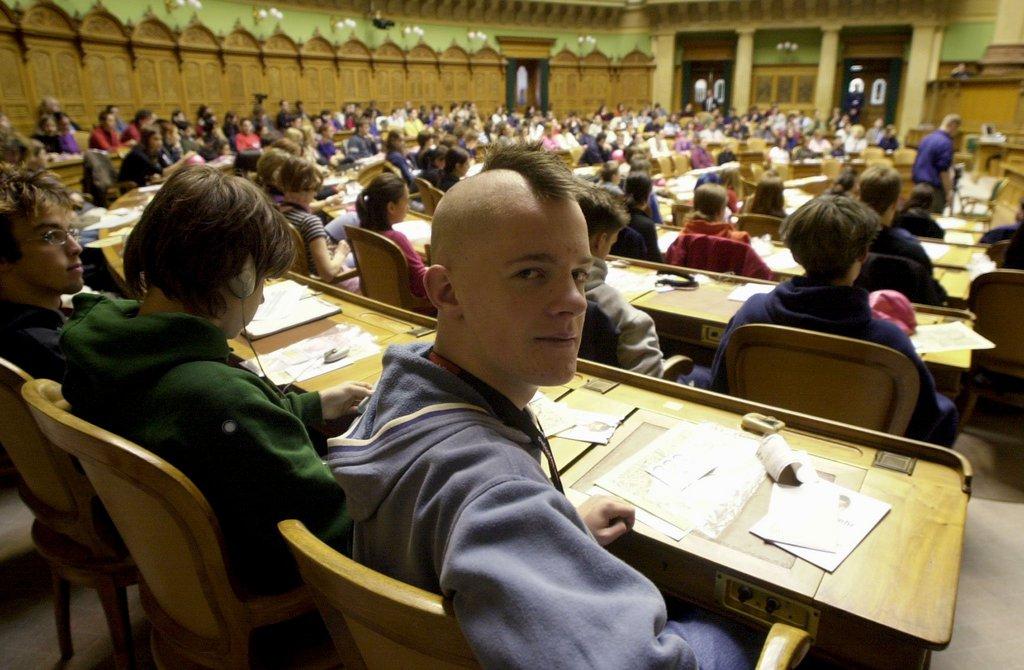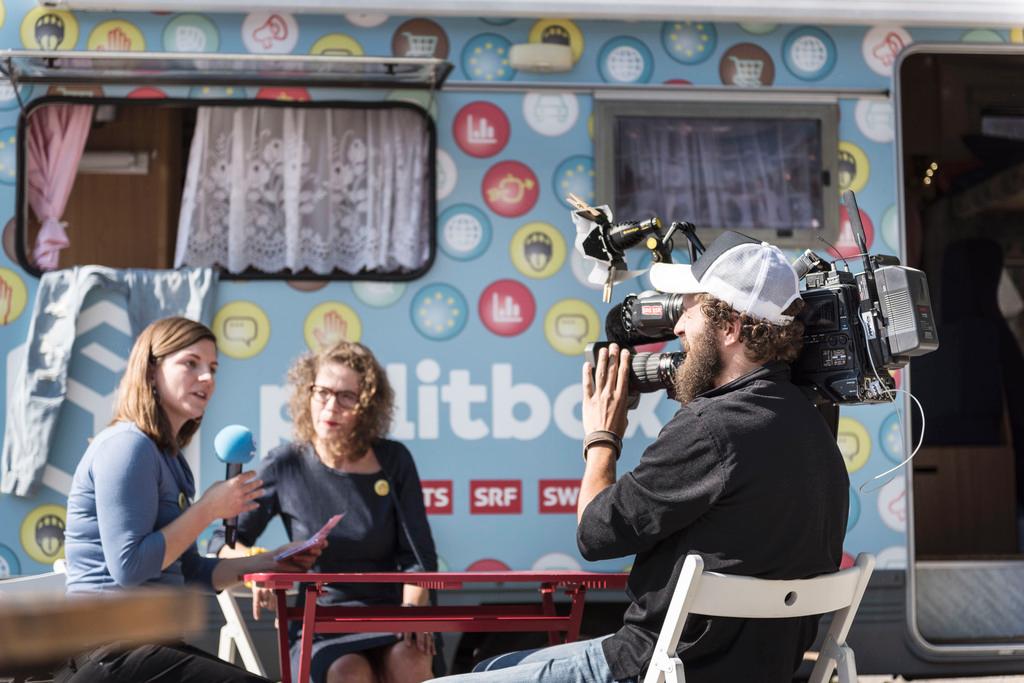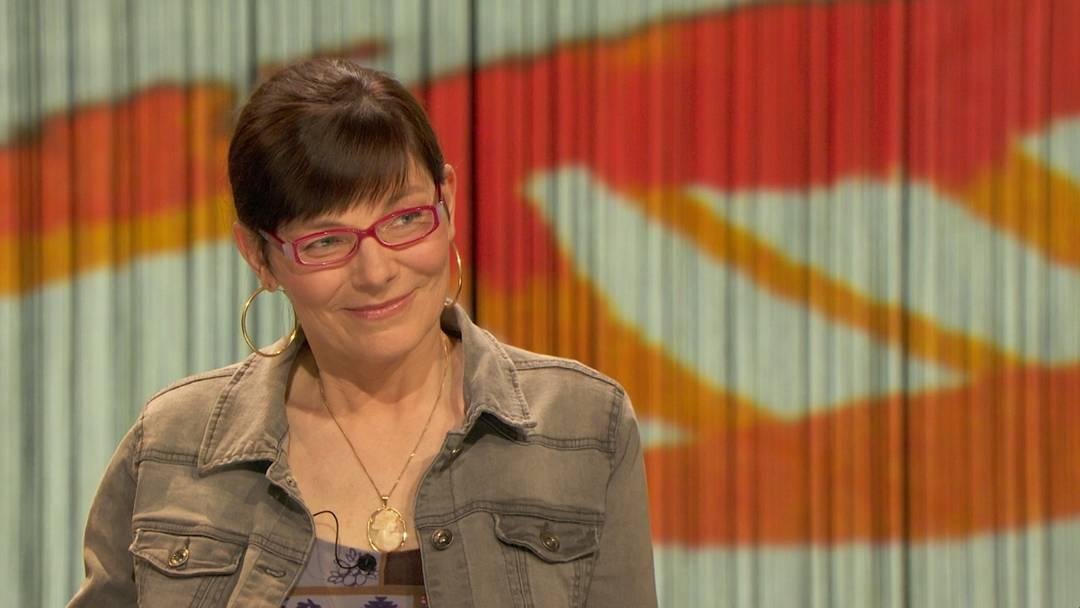Debating the best way to engage youth in politics

There is no question Switzerland’s youth have opinions that they want to share, so why do so few of them vote? A recent meeting of 40 Geneva students with Swiss and foreign politicians discussed ways of improving youth participation in decision-making.
Organised by the Inter-Parliamentary UnionExternal link (IPU), the debate of 17- and 18-year olds with politicians came to the broad conclusion that young people must learn to use the tools of democracy so they are less intimidated by the prospect of overt participation.
The meeting took place as part of the Geneva Democracy Week in mid-September.
A sense of intimidation was immediately evident when the moderator’s first questions met dead silence from the room. Taking the situation in hand, a parliamentarian from the United Arab Emirates, Faisal Al Tenaiji, encouraged participants to speak up.
“I don’t want you to be passive. The policy door is open to you, but it’s up to you to take the first step. I was like you once but when I became a parliamentarian I began to speak up,” said Al Tenaiji, whose words had the desired effect of loosening tongues.
Encouraging debate
Participants seized on the idea of learning and practicing the art of debating as an initial step towards political engagement. One student suggested organising debates in class to improve participation.
“I didn’t have civic education classes, but our philosophy teacher organised debates and that tweaked my curiosity for political life,” she said.

More
Youth votes needed to help meet future challenges
Another student had a similar experience in her French classes, while yet another told of a legal studies teacher who encouraged them to take an interest in the issues put to public votes.
Chantal Andenmatten, head of teaching and training for canton Geneva, told the group of a “youth debate” competition – run by the Dialogue Foundation and designed to encourage students – to practise and exchange arguments.
The project also offers teachers dedicated debate training with the aim of improving civic education.
Civic education
Several students underlined the importance of civics courses in school and a few lamented the lack of interest from some teachers.
“My teacher did not give us the impression that politics is interesting,” said one.
The parliamentarians were in agreement that civic education is crucial to encouraging participation in democratic life.
There are 45,113 parliamentarians in 190 parliaments around the world.
Just 1.75% of parliamentarians are under 30 years of age, and 22.5% are women.
In Switzerland, the House of Representatives counts just 1.5% of members under aged 30.
Women make up 30.5% of the House of Representatives, and 19.6% of the Senate.
“We organised debates in English classes which really helped me to see the different sides to an issue and to present arguments,” said Lithuanian parliamentarian Vytautas Gapsys.
He pointed out that parents, friends or youth associations should also be involved in encouraging an interest in politics.
Swiss parliamentarian Jean-Christophe Schwab explained that his interest in politics was developed within his family.
“Personally, I couldn’t count on school. Happily, my parents spoke to me a lot about politics. However a lot of my colleagues had classes that inspired them to get involved,” said Schwab.
Cash or quotas?
The IPU hopes not only to encourage people to vote but also to get them to actively take part in decision-making.
“They should be represented in the institutions,” says IPU general secretary Martin Chungong. “To guarantee it, certain mechanisms have proven to work, notably the use of quotas or seats reserved for young people.”
But participants in the discussion were wary of the potentially adverse effects of quotas.
“I think that quotas help to erode the credibility of those elected,” said one young woman. Another asked why quotas should be defined for one minority and not another. However, others spoke in favour of quotas.
“They can resolve the problem of a lack of female representation on the boards of businesses. Currently, they are not considered smart enough for the job,” said one student.
A question put by the moderator – the possibility of paying young people to vote – was met with general derision.
“It’s scandalous!” said one participant, while another added: “Instead of engaging young people, we create a group of young people who only do things for the money.”
Fear of failure
The participants also revealed their fears of not being cut out for the job of public representation.
“I have the impression that we should leave politics to the good people, to those who know how to do it,” said one young man. Many students were also against the idea of lowering the voting age to 16.
“At that age, we don’t have enough experience yet and we listen too much to the people around us,” said one student.
The complexity of political language was also singled out as a barrier but, citing his own experience, president of Geneva’s local youth parliament, Sylvain Leutwyler, encouraged the students to just go for it.
“We all have this image of the wise old man, but young people have a role to play in politics and their own viewpoint to bring,” he said.
Translated from French by Sophie Douez

In compliance with the JTI standards
More: SWI swissinfo.ch certified by the Journalism Trust Initiative














You can find an overview of ongoing debates with our journalists here . Please join us!
If you want to start a conversation about a topic raised in this article or want to report factual errors, email us at english@swissinfo.ch.